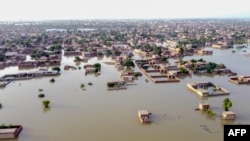Here's a look at what U.S. Secretary of State Antony Blinken and other top diplomats have been doing this week:
US-Pakistan
The United States, through USAID, is providing an additional $30 million in humanitarian assistance to Pakistan as the South Asian country suffers severe flooding caused by heavy monsoon rains, landslides and glacial lake outbursts that have occurred since mid-June. The flooding has damaged roads and more than 800,000 hectares of agricultural land, affecting an estimated 33 million people with more than 1 million homes destroyed.
The deadly floods bear the hallmarks of a climate catastrophe, according to scientists.
Pakistan Fatal Flooding Has Hallmarks of Warming
U.S. Secretary of State Blinken said in a tweet the aid provides critical humanitarian assistance, such as food, safe water and shelter.
US-Russia-Ukraine
Ukraine and Russia have traded accusations of attacks near Ukraine’s Zaporizhzhia nuclear power plant amid international concern the facility itself could be hit, causing a radiation leak.
The U.S. State Department has accused Russia of blocking a consensus document on a nuclear non-proliferation treaty because the agreement noted the risk posed by fighting near the Zaporizhzhia plant.
Russia Launches New Attacks Near Nuclear Plant, Ukraine Says
Meanwhile, a new Conflict Observatory report unveiled evidence of Russia-perpetrated filtration operations in, and forced deportations from, Ukraine.
"Russia’s filtration operations in Ukraine are devastating the lives of hundreds of thousands of civilians. A new Conflict Observatory report shines a light on these and other atrocities. We will continue to work to hold Russian officials accountable,” said Blinken in a tweet.
August 24 marked the anniversary of Ukraine’s Independence Day. The U.S. pledged another $3 billion for Ukrainian defense on that day, continuing its support for the country in fending off Russian military aggression. It’s the largest security assistance package for Ukraine since Russia’s invasion began in February.
US Announces Largest-Ever, $3B Ukraine Aid Package as War Hits 6-Month Mark
US-China–Taiwan
The United States said it will not accept China’s attempt to set a “new normal” by escalating military activities in the Taiwan Strait, including flying fighter jets over the median line in the strait.
The State Department said China overreacted and took unnecessary provocations over the past weeks following visits by U.S. members of Congress and elected officials, including House Speaker Nancy Pelosi, a Democrat from California, and Arizona Governor Doug Ducey, a Republican.
The U.S. said it seeks to maintain open lines of communication with China while supporting Taiwan.
Taiwan's Top Official on China Policy to Visit US Amid Tensions
Official: US Seeks Constructive Communication With China Amid Rising Tensions
US-Iraq
Iraq is in political turmoil after a powerful Shiite Muslim cleric announced he would resign from politics, leading to clashes between his followers and those of rival political groups. The U.S. called for dialogue after the disturbing unrest but said it saw no need to evacuate staff in its embassy at this time. The State Department said a Level Four Travel Advisory Warning — Do Not Travel — remains in place in Iraq for American citizens intending to travel there.
Five Killed in Iraq Clashes After Powerful Cleric Quits Politics
US-Iran
The State Department denied reports the U.S. and Iran have agreed to return to the 2015 nuclear deal, known as the Joint Comprehensive Plan of Action.
“That reporting is false. We have not concluded an understanding,” State Department deputy spokesperson Vedant Patel said Tuesday. “We received Iran’s comments on the EU’s proposed final text through the EU, and we have responded to the EU on Wednesday, August 24. Now it is up for Iran to answer.”
Bridged by EU, a final draft text was submitted earlier in August. Key sticking points remain, including supervision by the International Atomic Energy Agency, or IAEA.
A recent IAEA report showed Iran is pressing ahead with its rollout of an upgrade to its advanced uranium enrichment program. Iran said it will not return to the 2015 nuclear deal unless the IAEA ends an investigation. Iran has said its nuclear program is for peaceful purposes.
Iran Steps Up Underground Uranium Enrichment, IAEA Report Says
Iran Says No Return to 2015 Nuclear Deal Unless IAEA Ends Investigations




